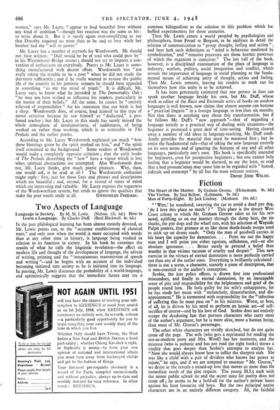Two Aspects of Language
IN the past philological learning has been almost entirely devoted, as Mr. Lewis points out, to the "accurate establishment of classical texts," and only now when the world is more occupied with words than at any other time in history, is language being studied in relation to its function in society. In his book he examines the results of what he calls the linguistic revolution—the effect on modern life and thought of the development of language, the advent of writing, printing and the "instantaneous transmission of speech and writing "—and he begins with an account of the individual becoming initiated into society as he is initiated into its language. In passing, Mr. Lewis discusses the probability of a world-language, and optimistically suggests that the immediate future may see a common bilingualism as the solution to this problem which has baffled experimenters for three centuries.
Then Mr. Lewis enters a world peopled by psychologists and philosophers, from Freud to Bergson, as he analyses in detail the relation of communication to "group thought, feeling and action " ; and here lurk such definitions as "mind is behaviour mediated by symbolisation," and " conative processes are those hormic processes of which the organism is conscious." The last half of the book, however, is a disciplined examination of the place of language in industry, warfare, politics, social integration and conflict, which reveals the importance of language in social planning as the funda- mental means of achieving unity of thought, action and feeling. Then Mr. Lewis retreats, leaving his readers to work out for themselves how this unity is to be achieved.
It has been generously estimated that one person in four can speak another language beside his own, but Mr. Duff, whose work as editor of the Basis and Essentials series of books on modern languages is well known, now claims that almost anyone can become a "practical linguist" in a foreign language in less than six months. Not that there is anything easy about this transformation, but if he follows Mr. Duff's "new approach "—that of' regarding a language strictly as a practical way of dealing with situations—the beginner is promised a great deal of time-saving. Having cleared away a number of old ideas in language-teaching, Mr. Duff confi- dently provides the material that must be mastered first ; but he omits the fundamental rule—that of taking the new language entirely on its own terms and of ignoring the features of any and all other languages, particularly one's own. His book is specifically intended for beginners, even for prospective beginners ; but one cannot help feeling that a beginner would be alarmed, to say the least, to read that a bad pronunciation may cause him to be regarded with "hatred, ridicule and contempt" by all but the most tolerant natives.
DAVID JOHN .WELSH.


































 Previous page
Previous page